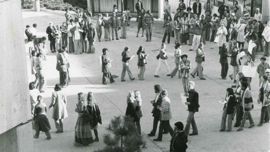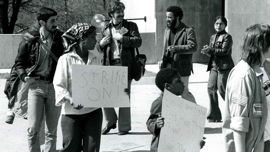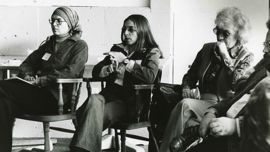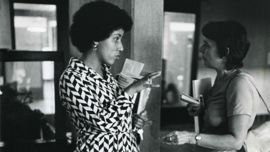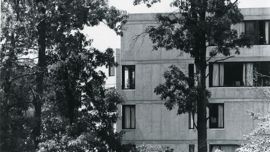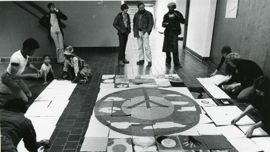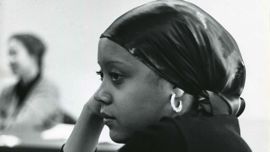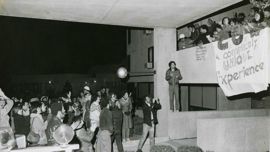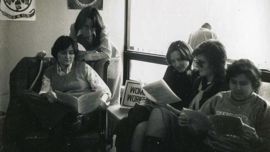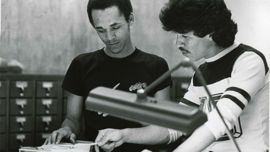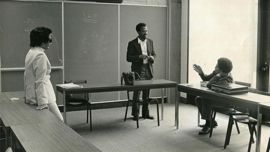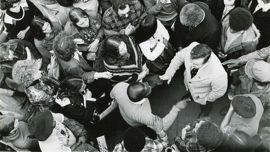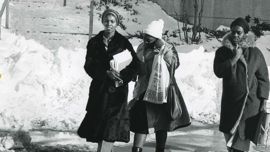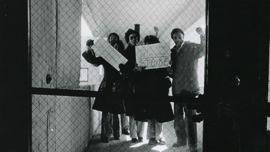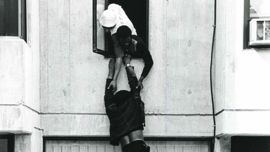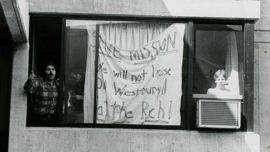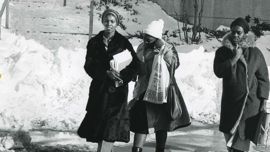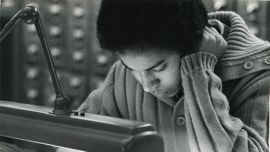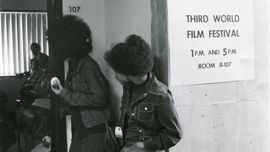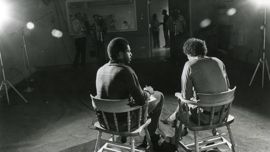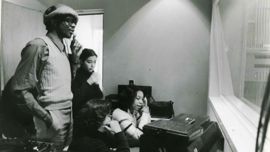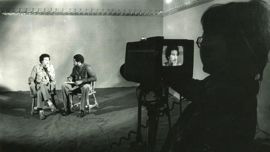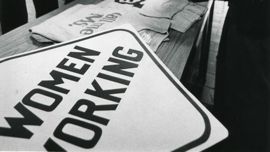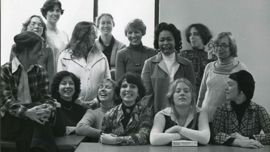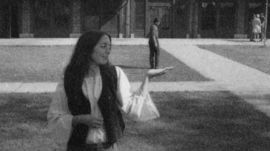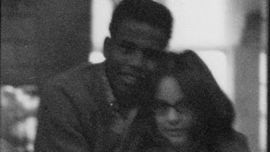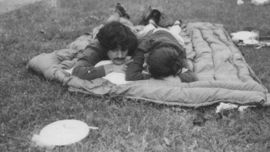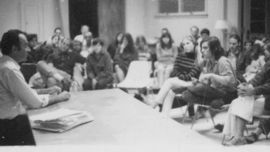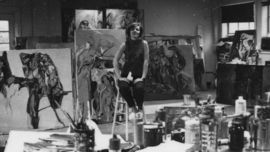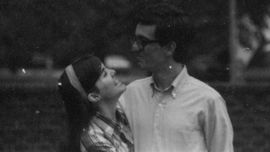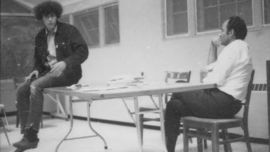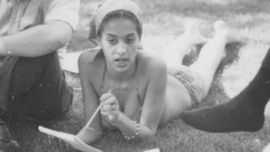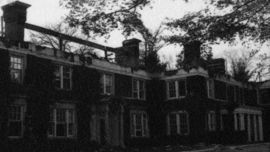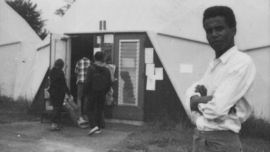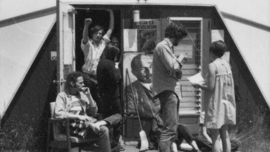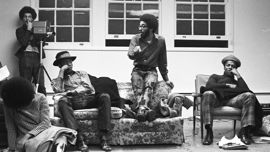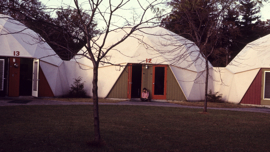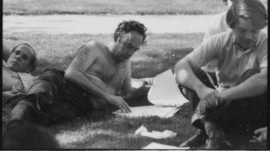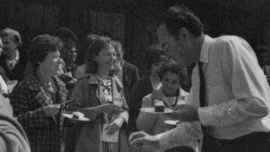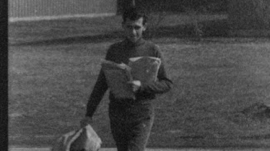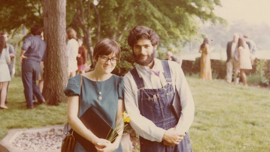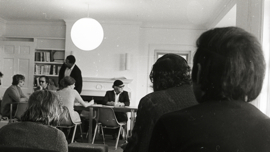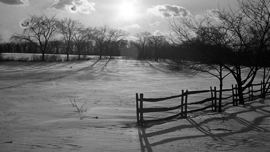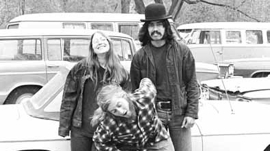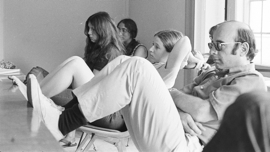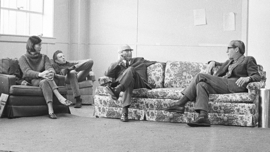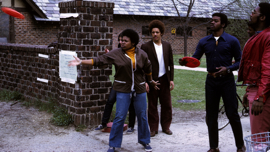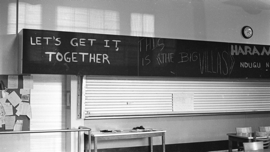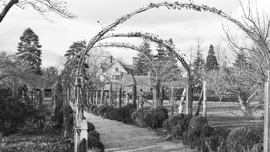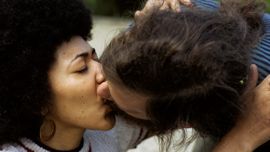“Clippings,” excerpt from John Maguire, “The Condition of the Campus: A Presidential Statement,” September 1979. Courtesy SUNY College at Old Westbury Archive. These clippings were collected for the college’s tenth year anniversary.
1979-Presidents-Report-celebration-small
Download (High Quality PDF)
SUNY College at Old Westbury, 1972 College Guide. Courtesy Samuel Von Winbush. This bi-lingual catalog shows the college’s shift in direction to seek out non-traditional college students—African-American and Latino students, but also low-income students. The catalog’s course listings indicate that predating the “culture wars” of the 1980s and 1990s, the college’s curricula sought to broaden the canon, offering a critique of contemporary society and traditional knowledge.
132871686-1972-SUNY-College-at-Old-Westbury-catalog-small
Download (High Quality PDF)
Harris Wofford, “Creating an Experimental College of a State University With Students As Full Partners: The Case of the College at Old Westbury,” for the UNESCO Meeting on New Models for Higher Education in Asia and America, January, 1970. Courtesy SUNY College at Old Westbury Archive. Harris Wofford describes the backgrounds of those who planned the college; examines the move from an internationalist “school of the world” to one that would address urban problems, and notes planners’ hope for a British “college of colleges” for the university structure. Planners and SUNY administrators in Albany disagreed on the nature of the college experiment, and ultimately tensions arose between students and administrators, and between faculty and administrators, over the college’s identity. Wofford also details the unraveling of planners’ aspirations—including the spring 1969 sit in, and Frankfurt School theorist Herbert Marcuse’s 1970 visit to the Old Westbury campus.
WoffordHarrisL-CreatingExperimentalCollege-Jan1970-pp46-small
Download (High Quality PDF)
The Old Westbury Gadfly, March 1969. Courtesy Jon Angel. The Gadfly indicates multiple points of friction between students and the college administration and trustees, including investments in South Africa and the selection of the college’s provosts.
SUNY-COW-Gadfly-v1n1-1969Mar13-small
Download (High Quality PDF)
Neal Weiner et al, “Statement of the Committee on the Liberal Arts,” February 1969. Courtesy, SUNY College at Old Westbury Archive. A committee composed of seven faculty and students sought to clarify the role of Old Westbury’s liberal arts education. Their struggle to even “sketch” such a program speaks to the larger cultural debate over the “relevance” of a college education in an era of rapid social transformation.
quirke 2. statment of the committee on Liberal Artspdf
Download (High Quality PDF)
Harris Wofford, “Letter to New Colleagues,” September 1968. Courtesy of SUNY College at Old Westbury Archive. The college’s first president describes conversations among faculty, administrators and student planners over curricula, the college’s organization, and students’ role in college decision-making. Wofford championed the “Great Conversation going on that has engaged the human race throughout history,” but he maintained the “best-sellers of 3000 years” had “shifted from Antigone to Malcolm X, from the Symposium to [Marshall] McLuhan.”
quirke 4 wofford letter to new colleagues
Download (High Quality PDF)
“Mugbook,” 1968.
mugbook 1
Download (High Quality PDF)
Marsha Kranes, “The Anatomy of Our State U: Old Westbury Students Will Shape Own Destiny,” Long Island Press, May 21, 1968. Courtesy SUNY College at Old Westbury Archive. Local paper describes Old Westbury’s educational aspirations.
OldWestburyStudentsWillShapeOwnDestiny-LongIslandPress-1968May21-small
Download (High Quality PDF)
Harris Wofford, “Things that Fire Can’t Burn, Excerpts from Talk to Meeting of Headmasters of Friends Schools,” April 1968. Courtesy of SUNY College at Old Westbury Archive. The college’s first president reflects on the fire which consumed the school’s main building, comparing it to the radicalism of higher education reform.
quirke 3 wofford things that fire cant burn
Download (High Quality PDF)
